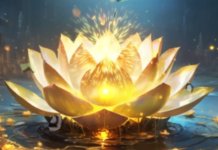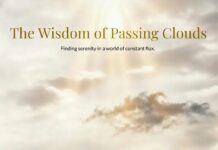Dear Dharma Friends,
Welcome to this episode of the podcast provided by the Buddhas’ Practice Incorporated of Australia.
Today, I want to explore a profound topic with you: how our inner state not only affects our relationships but also every single cell in our bodies. We often talk about conflict and harmony, from minor spats between couples to the workings of families, teams, and even entire businesses. The key to harmony lies in whether we “get worked up.” If we can avoid getting agitated, then do we push each other away or help each other succeed? This relates to a magnificent concept: the “Six Kinds of Respectful Harmony” in Buddhism. Without it, all things cannot truly unite and achieve.
This principle of inner harmony applies not only to human relationships but also deeply to our bodies.
Our bodies are composed of countless carbon atoms. But have you ever wondered how these atoms are arranged to make you a living being of flesh and blood instead of a pile of carbon ash? It all comes down to your inner structure and arrangement. When our bodies become so fragile that they are easily affected by external stimuli—getting sick, or lacking this and that—it reflects an inner imbalance.
So, how do we cultivate this? When your mind is altruistic, you won’t feel a sense of lack. Our bodies need over 100,000 types of protein. How can we possibly get all of them from external sources? In reality, our bodies synthesize them all themselves. This synthesis involves immense changes and precise transportation, where not a single detail can be missed.
The fundamental principle behind this is your “altruistic heart.” Once you develop an “exclusive heart,” your liver will reject your lungs, your lungs will reject your liver, and even cell will reject cell. You’ll think, “I know you need that, but I don’t like you, so I’m not going to give it to you!” Your immune and endocrine systems, which are supposed to secrete what your body needs most, will become picky when your mind sends a signal of “exclusivity.” They’ll think, “I’ll give more to the cells I like, less to the ones I don’t, or even nothing at all.” This leads to disease.
This is precisely why nutrition science, which was once extremely popular, has declined. In the 1980s, top universities worldwide had nutrition departments, and many students were eager to study. But later, fewer and fewer people pursued it, and the departments shrank. They discovered that the master nutritionists who taught the students, no matter what they ate or what supplements they took, still lacked what their bodies needed and still got sick. The chemicals, herbs, and animal extracts they supplemented seemed to “disappear” after entering their bodies. Their bodies still lacked what they needed, and some of them even died from nutritional problems. This wasn’t simply a matter of too much or too little nutrition; it was because many nutrients simply couldn’t be absorbed or utilized by the body.
Ultimately, they discovered that when your inner state is good, the invisible, microscopic world within your body synchronizes with your consciousness. When you’re distressed, every cell in your body is distressed. When you’re compassionate, they’re all compassionate. When you’re altruistic, they all help each other. Cells will “hurry to supplement what’s lacking” and even find ways to remove the excess, allowing the body to immediately achieve inner balance.
That’s why the Buddha said to see all sentient beings as Rahula. This is not a metaphor; it means the entire body will undergo spontaneous changes. During the time of the Buddha, there were no words for “microorganisms,” “bacteria,” or “viruses,” so they were collectively called “worms” to indicate that they were living. The human body is like a “city of 80,000 households of worms.” We have over 100,000 types of proteins, and their breakdown and synthesis are all different. The relationship between proteins and enzymes is particularly crucial: your temperament and personality produce certain proteins, and these proteins then produce corresponding enzymes, allowing the body to function smoothly and be healthy.
However, some proteins and enzymes can also make you sick. Where does the “transcription information” for these disease-causing proteins and the enzymes that find these disease points come from? When we are born, we carry a “data packet” that is transcribed into our DNA. This DNA can be seen as the “source” or “innate information” of our bodies. It determines which karmic fruits will mature in this lifetime.
But what’s even more important is that your current “afflictions” and “mental state” directly influence the signals your DNA releases and what substances your endocrine system produces. The signals you give it determine what it produces. If you are angry, sad, and constantly experiencing suffering, your body will continuously release corresponding substances, literally causing physical pain and making you feel unwell here and there.
Medicine has also learned that everything inside the human body is influenced by your consciousness. When you have an altruistic heart, all the cells within you are also being altruistic. And aren’t these “inner others” just yourself?
Therefore, we must distinguish between two things: one is the “karmic fruit” carried over from your past lives and matured in your DNA—this is the “source” of your life. The other is the “current condition” formed by your present “emotions” and “afflictions.” This “current condition” influences how the “source” manifests. It’s like a prophet whose predictions are 80-90% accurate based on the “source.” But why aren’t they 100% accurate? Because the “current condition”—your present actions and consciousness—is inserted in between. If you add good conditions, you can improve; if you add bad conditions, you will get worse.
This is why many diseases are classified as “innate” or “genetic problems with an unknown cause.” This is because science cannot understand that when the body manifests, our current “conditions” are added to the equation. Some bodies can “create a disease out of nothing,” while others can grow “treasures,” like bezoar in a cow or even what seem like gemstones in the human body. These things may be useless to the animal itself but are precious medicines or spices to humans. This demonstrates that the body’s deep, spontaneous changes far exceed the understanding of modern science.
The greatness of the Dharma lies in its revelation of the most direct and fundamental influence of our consciousness on our lives and bodies. Health is not just determined by external nutrition; it is more dependent on our inner state—a pure, altruistic, and compassionate heart. When our inner being is in harmony, our bodies will naturally achieve balance, and our lives will naturally be extraordinary. Thank you.





